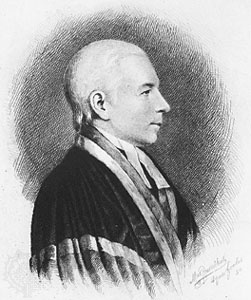Paterson, William
British economist
born , April 1658, Tinwald, Dumfries, Scot.
died Jan. 22, 1719
 Scottish founder of the Bank of England (England, Bank of), writer on economic issues, and the prime mover behind an unsuccessful Scottish settlement at Darién on the Isthmus of Panama.
Scottish founder of the Bank of England (England, Bank of), writer on economic issues, and the prime mover behind an unsuccessful Scottish settlement at Darién on the Isthmus of Panama.By 1686 Paterson was a London merchant and a member of the Merchant Taylors' Company. Prior to this time, he had pursued his livelihood in such places as Bristol, England, as well as the Bahamas and Europe. In 1692, when Parliament sought ways to pay off England's war debt, Paterson was among the first to submit a proposal that, although rejected in its early form, established the use of public debt borrowed from a bank. The plan that Parliament approved was drafted by Paterson and others such as Charles Montagu (Halifax, Charles Montagu, 1st earl of, Viscount Sunbury), then a lord of the Treasury. In 1694 the Bank of England was organized with Paterson as a founding director. He withdrew as a director the next year, however, following a policy disagreement.
After an unsuccessful attempt to organize a rival bank in London, Paterson resumed efforts to start a colony at Darién. Along with a group of Scottish and English merchants seeking investment outlets, he secured in 1695 the passage by the Scottish Parliament of the Act for a Company Trading to Africa and the Indies. Paterson was deprived of his position in the company by the directors because he was suspected of being involved with a loss of company funds, although his guilt was never proved. He nevertheless accompanied the expedition in 1698 as a private citizen. Paterson lost much of his financial investment in the affair. His wife and child died at Darién, and he was forced to return to England after falling gravely ill. Thereafter, Paterson continued agitation for new expeditions to the West Indies. Shortly before his death, the British government paid him an indemnity for the losses incurred in his ill-fated expedition.
Paterson is credited with persuading William III to consider uniting England with Scotland (culminating in the Act of Union (Union, Act of) in 1707), and he is also credited with contributing to the formation of the Royal Bank of Scotland (Royal Bank of Scotland Group) (established in 1727).
United States statesman
born Dec. 24, 1745, County Antrim, Ire.
died Sept. 9, 1806, Albany, N.Y., U.S.
Irish-born jurist, one of the framers of the U.S. Constitution, U.S. senator (1789–90) and governor of New Jersey (1790–93). He also served as an associate justice of the U.S. Supreme Court from 1793 to 1806.
Paterson emigrated to New Jersey with his family in 1747. He graduated in 1763 from the College of New Jersey (now Princeton University), studied law, and began to practice in 1769. He served twice in the provincial congress (1775–76), was a delegate to the state constitutional convention (1776), and from 1776 to 1783 was attorney general of New Jersey. In 1787 Paterson headed the New Jersey delegation to the federal Constitutional Convention, where he played a leading role in the opposition of the small states to representation according to population in the federal legislature. As an alternative to the Virginia (or large-state) Plan, Paterson submitted the New Jersey (or small-state) Plan, also called the Paterson Plan, which advocated an equal vote for all states. The issue was finally resolved with the compromise embodied in the bicameral Congress—representation by population in the House of Representatives, and equality of states in the Senate.
Paterson was instrumental in securing ratification of the final document in New Jersey and was elected one of the state's first two U.S. senators. Resigning his seat in 1790, he served as governor of New Jersey until 1793, when he was named an associate justice of the U.S. Supreme Court. The city of Paterson, N.J., was named for him.
- Bhimrao Ramji Ambedkar
- Bhind
- Bhir
- Bhiwani
- Bhojpur
- Bhonsle dynasty
- Bhopal
- Bhopal disaster
- BHP Billiton
- Bhubaneshwar
- Bhuj
- Bhuj earthquake of 2001
- Bhumibol Adulyadej
- Bhusawal
- bhut
- Bhutan
- Bhutan, flag of
- Bhutia
- Bhutto, Benazir
- Bhutto, Zulfikar Ali
- Bhêly-Quénum, Olympe
- Bhāgavata
- Bhāgavata-Purāṇa
- bhāngṛā
- Bhāsa